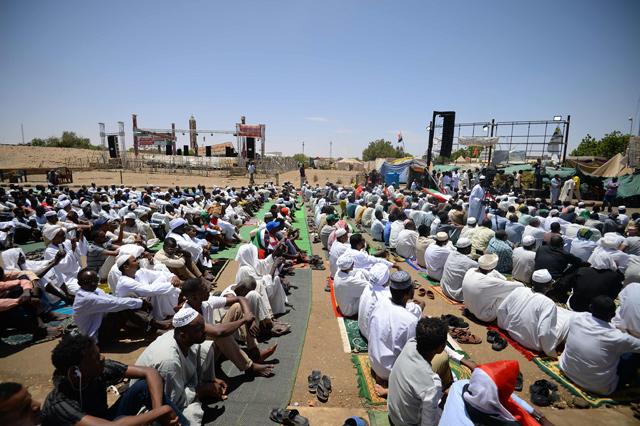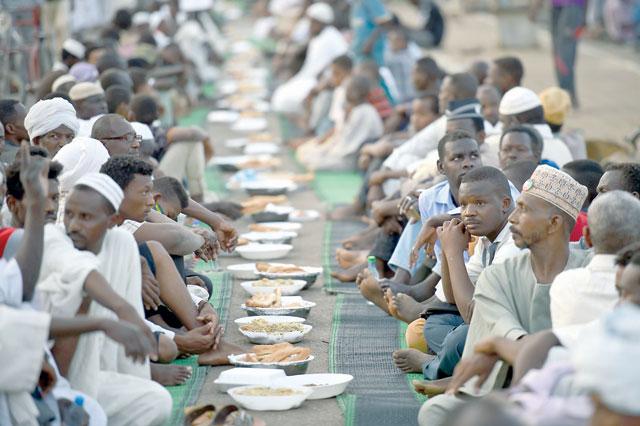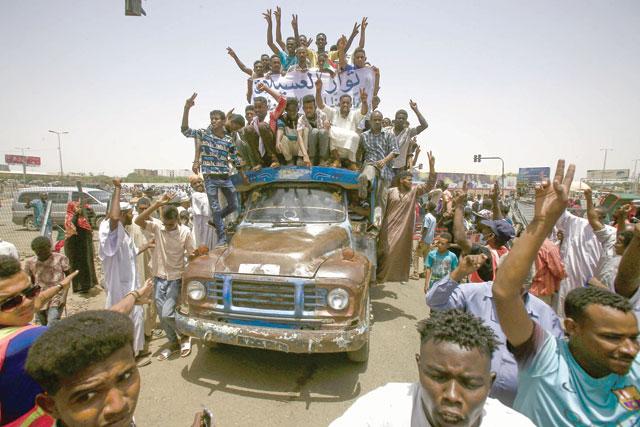You are here
Sudan's top opposition rejects strike call in protest rift
By AFP - May 27,2019 - Last updated at May 27,2019

Sudanese protesters attend the Friday prayers near the military headquarters in the capital Khartoum on May 17, during an ongoing sit-in demanding a civilian-led government transition (AFP photo)
KHARTOUM — Sudan's main opposition group and supporter of the protest movement on Sunday rejected its call to stage a two-day general strike, in the first sign of a rift within the movement negotiating the launch of civilian rule.
Talks between leaders of the umbrella protest movement, the Alliance for Freedom and Change, and army generals who seized power after ousting autocrat Omar Al Bashir last month are deadlocked over who should lead a new governing body — a civilian or soldier.
In a bid to step up pressure on the generals, the protest movement has called for a general strike starting Tuesday, but the National Umma Party, a key backer of the movement, rejected the measure.
"We reject the general strike announced by some opposition groups" in the Alliance for Freedom and Change, Umma said in a statement.
"A general strike is a weapon that should be used after it is agreed upon by everybody," the party said.
"We have to avoid such escalated measures that are not fully agreed."
The National Umma Party led by former premier Sadiq Al Mahdi said any such decision should be taken by a council of leaders of the protest movement.
Such a council was still not in place and “will be composed in a meeting on Monday”, it said.
It was Mahdi’s elected government that Bashir, who himself was deposed on April 11, toppled in an Islamist-backed coup in 1989.
In a recent interview with AFP, Mahdi warned protesters not to “provoke” the army’s rulers as they had been instrumental in ousting Bashir.
‘Negative development’
Sudanese political analyst Faisal Mohamed Saleh said the Umma party’s stand was a “negative development”.
“It will not only threaten relations between Umma party and the Freedom and Change alliance, but it will also threaten unity inside the Umma party itself,” Saleh told AFP.
“I believe this is not the party position, it is Mahdi’s position because there were representatives of the party in meetings that decided on the strike call.”
Saleh said a “harsh reaction” could not be ruled out from alliance supporters at the sit-in outside the army complex.
Minutes after Umma’s statement, another key member of the protest movement, the Sudanese Congress Party, said the strike would go ahead as planned.
The strike was a new measure “to complete the mission of the revolution, which definitely will achieve its victory”, it said.
The military toppled Bashir after months-long protests across Sudan led by the Alliance for Freedom and Change against his iron-fisted rule of three decades.
But the generals who seized power have resisted calls from protesters and the international community for civilian rule.
Talks deadlocked
Talks between the generals and protest leaders remain deadlocked over who should lead a new governing body to oversee the formation of a civilian administration.
On Sunday, the military council said the talks were “proceeding at a weak pace”.
“If the situation continues like this, it might lead to many options for safeguarding the interests of Sudanese citizens and for the country’s protection,” spokesman of the army council Lieutenant General Shamseddine Kabbashi told soldiers in Omdurman, the twin city of Khartoum.
Protest leaders insist a civilian must head a new sovereign council and that civilians should make up the majority of its members, proposals rejected by the ruling generals.
The new ruling body when finalised is expected to install a transitional civilian government for three years after which the first post-Bashir election would be held.
Before suspending talks last Monday, the two sides had agreed on several key issues, including the three-year transition period and the creation of a 300-member parliament, with two thirds of lawmakers coming from the protesters’ umbrella group.
On Sunday, the chief of the ruling military council General Abdel Fattah Al Burhan travelled to the United Arab Emirates after a visit to Cairo.
The United Arab Emirates, Saudi Arabia and Egypt are seen as backing the generals, while Western powers led by Washington have called for a swift transition to civilian rule.
Related Articles
KHARTOUM — Sudan's veteran opposition leader Sadiq Al Mahdi rejected on Wednesday a call for nationwide mass demonstrations against the coun
KHARTOUM — Sudan's army rulers and protesters are to resume talks over handing power to a civilian administration, protest leaders said Satu
KHARTOUM — A top opposition leader called on Saturday for Sudan to join the International Criminal Court which has indicted its ousted presi


















